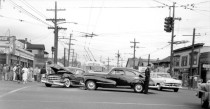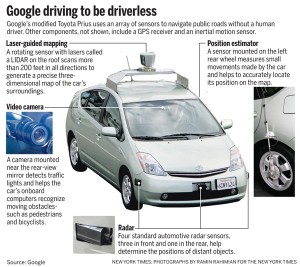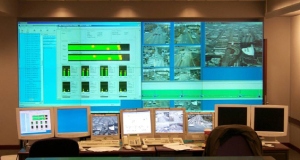A long, long time ago in a galaxy – well, actually, a City – far away, I was a police officer – a street cop. I witnessed some of the most horrific episodes of my life as I came upon scenes of automobile collisions with gruesome injuries. I also wrote my share of speeding tickets (and NO, I did NOT have a quota!) and arrested a fair number of drunk drivers.
New technology, however, heralds the potential for an end to automobile collisions, speeding tickets, drunk driving and even most traffic management. Gee, there’s even the possibility that the traffic jam may be relegated to the dustbin of history (along with the dustbin itself, I might add).
A combination of technologies is maturing which foretells such a future.
The first one, of course, is the driverless car. Google has been at the forefront of prototyping that vehicle, to the point where California and Nevada have both passed laws explicitly allowing such vehicles on their roads. Beyond Google, most of the major automobile manufacturers are also testing driverless vehicles. And it’s only a matter of time before such vehicles are regularly driving our roads.
Next, we are seeing the appearance of the “vehicle area network” and “networked vehicles”.
I just purchased a new 2013 Toyota Prius C (and then promptly crashed it in a minor accident – subject matter for a different blog post). When I plugged my iPhone into the Prius to charge it, the Prius recognized the iPhone and linked to it, and offered the ability to use the iPhone’s cellular connection to link the Prius’ own touchscreen display, maps and apps to the wider world. Toyota also has an “entune” app for this purpose.
We’ll see much more of this in the future – where cars are linked to the Internet. BMW already connects most of its vehicles worldwide to collect performance data via Teleservices. GM’s Onstar has been around for a number of years. Insurance companies are starting to offer discounts for good drivers who consent to put a monitoring device in their vehicle to sense sudden starts and stops, speeding, and other actions which may be dangerous (or at least insurance companies think are dangerous).
Future vehicles will have networks which link the vehicle to all your personal devices – keys, smart phone, tablets, DVD players and more, to keep you “connected” and in control on the highway.
Furthermore, cars will talk to each other. They could exchange location information, proximity information, directional information and much more. In this fashion cars might be able to avoid each other or allow for smooth lane changes and turns without colliding.
A related development is the instrumentation of the highway.
I had the privilege of working with the Seattle Transportation Department, which was at the forefront of intelligent transportation systems (ITS), when I was City CTO there. Today ITS means, for the most part, traffic sensing and detection devices to time traffic signals, extensive networks of traffic cameras linked with fiber cable, readerboards on streets, and some novel technologies like traffic time estimators and displays. Mobile apps are all the rage, of course, to display traffic conditions. Seattle just launched an amazing mobile app which actually shows live video from traffic cams on your smartphone.
Indeed, the City of Los Angeles just became the first major City worldwide to automate all of its 4,500 traffic signals, synchronizing them. That will reduce travel times somewhat, although our experience with expansion of capacity (e.g. building new freeways or widening them) is just that more traffic is generated.
But sensors and instrumentation can be taken a step further.
Almost everything in the roadway could, of course, be instrumented – sensors in guard rails, school crosswalks, stop signs, bridges. Such sensors might not only collect information but also broadcast it to traffic management centers or, indeed, nearby vehicles.
Your car would know when you are approaching a stop sign and automagically apply the brakes – gee, the “California stop” might become thing of the past. As you approached a school zone during school hours, your car would automatically slow to no faster than the allowable speed. Radars or sensors in the vehicle would detect the presence of children and stop for them – indeed, if every child was somehow sensor-equipped, they might never be struck by cars whose intelligent management systems would automatically avoid them. (And no, I am NOT going to discuss the potential for placing microchips in human beings, although some sort of sensor attached as a smart phone or bracelet or watch DOES have its advantages!)
And you can see where this is leading – as cars become more “intelligent” with their own networks and sensors, and roads become more “intelligent” with their own sensors, networks and computers, the need for human drivers may become irrelevant.
- You could put your 3 year old alone in a vehicle, tell it to take her to daycare, and have it drop her off there and return home.
- Drunks (or their Washington-State modern day equivalents: pot smokers) could stumble into their cars and the vehicle would quickly and efficiently woosh them home – or to the detox ward, as the case may be, with almost zero chance of that drunk killing or maiming someone.
- With driverless cars, even the need for taxicab drivers might be eliminated – you’d use your smartphone to call a taxi and it would smoothly come to the curb;
Speeding tickets, collisions, accident investigations, even automobile deaths might become history.
This, of course, has many implications for local and state governments:
- Cops would no longer “work traffic”, investigate accidents or write tickets – they’d concentrate on investigating and preventing non-traffic crimes;
- There could be a new set of government regulations requiring regular maintenance of vehicles and government inspections of them, because the only major source of collisions would be mechanical failure;
- Emergency rooms and morgues would not be treating traumas and death from car collisions;
- A significant source of revenue for local governments (traffic tickets) would dry up, although they could respond by increasing parking rates or licensing fees;
- As emergency vehicles speed to fires or crimes, traffic would autmagically stop and pull over – somewhat like the parting of the Red Sea – reducing response times for police and fire.
- Lawyers and courts would be freed (or put out of a job) litigating traffic accidents and court cases (see my blog post here explaining why most lawyers will be become history anyway);
- Auto insurance rates would drop steeply, and, again, put a lot of people out of work adjusting claims, fixing cars, etc.;
- Indeed, traffic might actually move faster and more efficiently through cities because the need for traffic lights and synchronization might end as vehicles negotiate with each other to speed along roads and through intersections. However traffic signals would not go away in many places, because pedestrians still need to cross streets;
- Transportation departments would probably spend less time building new roads and widening existing ones, but high quality roads would be essential to prevent damage to vehicles driving at higher speeds.
- Many delivery jobs might be gone. Perhaps mailboxes would move to the curb (if not there already) and driverless Postal Service, UPS, FedEx and similar vehicles with robotic arms would just deposit most mail and packages in the box. This is a logical extension to today’s robot-filled Amazon warehouses. Of course how people are able to buy anything to be delivered, given all the job losses, is a separate issue!
I don’t expect to see this traffic “nirvana” anytime soon. But I clearly see it on the horizon. Yes, there will be a lot of disruption and both loss of jobs and creation of new, unknown ones.
But I welcome the day when grandparents are not killed and ripped from their families by drunk drivers. I hope to see over 36,000 Americans saved from needless death and 3.9 million from injury at the hands of automobiles and their drivers.






Pingback: My Love-Hate Thang with Ballmer’s Microsoft | the Chief Seattle Geek blog